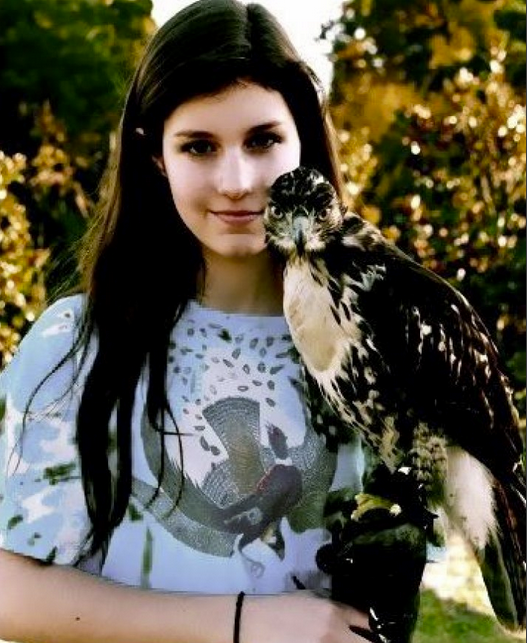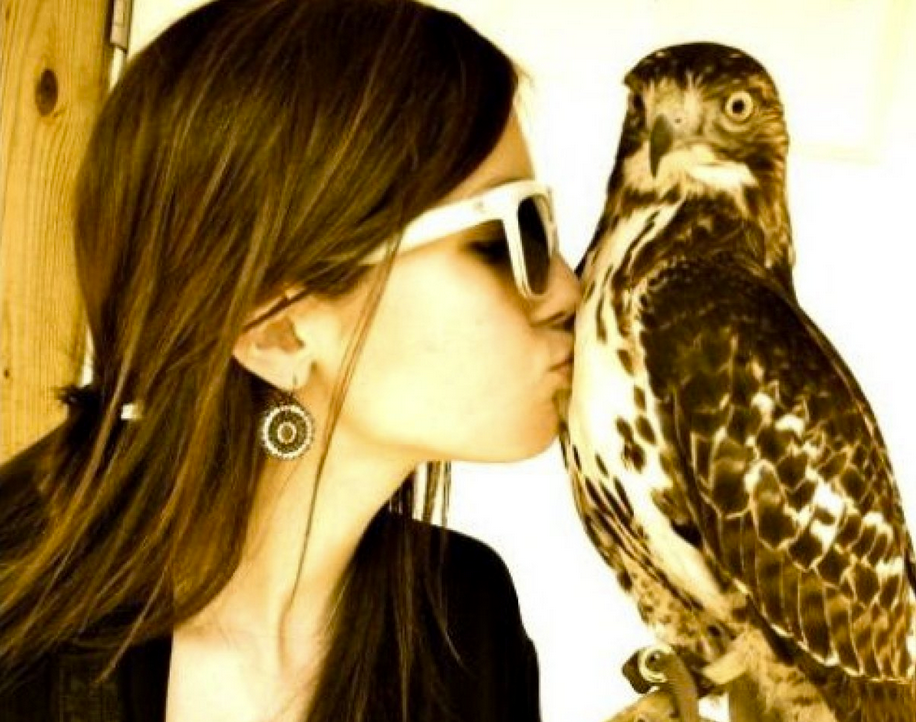
Jacqueline Barry is a 20-year-old full-time student at Davidson College in North Carolina. She’s also a falconer -- someone who is licensed to hunt with and care for a bird of prey. We saw a post she placed on Reddit inviting users to “Ask Me Anything,” and we were intrigued. The following is her story, as told to Emma Gray.
I was 16 when I first got interested in falconry. I went to an all-girls boarding school in West Virginia, and as part of our community service we would go to a local resort and work with the birds there. I met some falconers there, and I became obsessed. I was always passionate about wildlife and nature, but falconry allows you to not just witness but participate in something that, in the wild, happens every day.
Once your hawk catches the prey -- for me personally, it’s mostly squirrels and maybe a few rabbits -- the falconer goes in for the kill and dispatches it quickly to respect the prey and the bird. For squirrels, we cut the spinal cord, and it dies instantly rather than let the raptor herself kill it, which could take some time. It's much more ethical to put it out of its suffering, and I believe that way is the most humane method.Then you reward the bird with a piece of meat and slip the kill in your bag. The majority of the kill you’ll put in the freezer and feed it to the hawk later. I don’t treat my bird as if she’s a loyal dog who’s happy to see me. I just don’t think that that’s the way a raptor’s brain necessarily works.
It takes a lot of studying to become a licensed falconer. You have to contact your state falconry club and they’ll send you information and a list of potential sponsors. One you find a sponsor and then you study to take an exam, which has 100 questions. You have to get an 80 to pass. Then you buy equipment and construct a facility where the bird will be housed, and get it inspected. The falconry license entitles you to trap a bird of prey, and to keep it and hunt with it.

I can only own one falcon at a time for now, because I’m still an apprentice. You’re an apprentice for two years, and your sponsor teaches you everything you need to know, and then you can apply to be a general rank. After five years you can apply to be a master falconer. This is my first year training and hunting my own bird, and getting licensed, in this country. I practiced falconry for awhile before in the UK, where a license isn’t required.
I had a bird named Clover, which belonged to my sponsor, but she was transferred back to him and renamed Arrow. I hope to trap a new bird in three weeks when my new license arrives. Trapping is amazing -- it’s a huge adrenaline rush. I personally select female birds, because female birds in the raptor world are one-third larger than their male counterparts. That translates to more power, generally.
I live in my own apartment, so when I have a bird, I keep her in my backyard, and I can see her through my bedroom window. On days when I have classes, I spend about two to three hours with the bird. And when I’m not in class, I’m pretty much spending all my time with her.
I feel like my life is super different from my classmates' lives. My girlfriends and I can go out and have fun during the weekend, but I’m always really tired because I’ll have been out with the bird all day. But I still like to do what other girls my age like to do. There’s definitely a fine balance, but I try to make it happen.
I started working with my current sponsor around May. I had another sponsor, but he was far away. I found somebody else who’s a lot closer, and we get along really well. I had wanted to look to see if there was a female falconer to sponsor me, but it was difficult to find one close by. It wasn’t a big deal to me to have a male sponsor. There are definitely women falconers out there, but it’s a predominantly male sport.
I’ve definitely been hit on by fellow falconers. I think it’s kind of a problem because it can discourage women from joining the sport. I don’t want to say that women falconers aren’t well-respected, because they are, but I think they may have to work harder to attain the same respect that a male falconer gets. But if you show up at a meet and you’re a woman falconer, and you’re young, and your bird is catching game consistently and your bird is in impressive condition, that’s going to impress a lot of people regardless of what gender you are.

There’s a very strong community of falconers and everyone kind of looks out for each other. I’ve made a lot of close friends. I worked abroad doing an internship at a hawking center in Britain. We’re friends on Facebook and we talk to each other and give each other advice about birds. It’s a special relationship. Falconry is a lifestyle, not a hobby. To find someone who has that same passion -- you can relate on a level that’s different than with my other friends from college.
I hope to take a year off after graduation and intern for the World Center of Birds of Prey, or something like that, and then try to go to Cornell for grad school to keep studying birds. As a falconer, I’m a part of nature, a part of what happens daily. I’m an active participant in it, and that’s a really good feeling.
FALCONRY VOCABULARY CHEAT SHEET
Quarry: The prey caught by a raptor.
Raptor: Any bird of prey (hawk, falcon, eagle, owl, etc.)
Hawk: Large raptors of the genera buteo and accipiter with broad wings and long tails.
Falcon: Falcons are medium-sized raptors of the genus falco with long pointed wings. Falcons are also called "hawks" in the falconry world, but hawks are never called falcons.
LOOK: Jackie And Her Birds Of Prey

